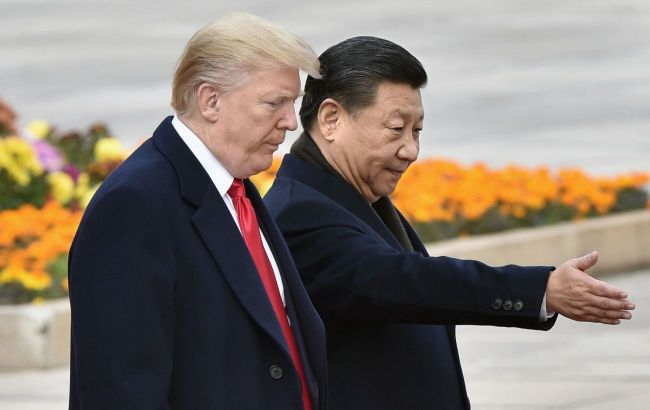Trump offers China tariff relief in exchange for action against fentanyl
 Photo: US and Chinese leaders Donald Trump and Xi Jinping (Getty Images)
Photo: US and Chinese leaders Donald Trump and Xi Jinping (Getty Images)
US President Donald Trump, ahead of his meeting with Chinese leader Xi Jinping, announced his readiness to reduce tariffs on imports from China if Beijing helps combat fentanyl, according to Bloomberg.
Tariff reduction in exchange for fighting fentanyl
"I expect to be lowering that because I believe they’re going to help us with the fentanyl situation," the head of the White House told reporters aboard Air Force One en route to South Korea.
It is noted that fentanyl is a dangerous opioid whose use has caused numerous deaths among Americans. Fentanyl and Trump’s declared war on the drug trade were among the reasons for imposing tariffs against Canada, Mexico, and China.
Earlier, the US administration stated that Chinese officials had not taken sufficient measures to stop the supply of fentanyl precursors that criminal cartels use to produce the deadly drug distributed in the United States.
According to media reports, Beijing also seeks to reduce tariff pressure on its exports to the US, and a tariff cut amid fentanyl-related agreements could make Chinese goods more competitive on the American market.
The Wall Street Journal earlier reported that Trump is considering cutting the current 20% tariff on Chinese goods to 10%.
Trump ready to grant access to Nvidia chips
The US leader is also prepared to discuss issues related to artificial intelligence and Nvidia microchips during his upcoming meeting with Xi Jinping, expected on Thursday.
The American president suggested that as part of a trade deal, China could gain access to the new Nvidia Blackwell processor — a move that could raise concerns in the US Congress.
“We’ll be speaking about Blackwells", Trump said, touting that it’s a "super duper" chip that’s years ahead of other countries, adding that Nvidia CEO Jensen Huang recently showed him the new model in the Oval Office.
Nvidia’s shares on the alternative Asian trading platform Blue Ocean rose 8.5% following Trump’s statements.
According to Reuters, Nvidia has not yet applied for a license to export Blackwell chips to China. Previously, Washington allowed the export of a less powerful version — the H20 — that complies with US export restrictions, but shipments have not yet begun.
Soy purchases, TikTok, and transport duties
Over the past weekend, US and Chinese representatives in Malaysia reached preliminary agreements on trade issues, which Trump and Xi are expected to finalize during their meeting. The sides are also expected to discuss lifting a number of export restrictions, tariffs, and fees.
Among the possible steps is China’s large-scale purchase of American soybeans, which Beijing had earlier canceled. The parties will also discuss reducing transport fees and Washington’s consent to sell the US division of TikTok to a consortium formed by Trump’s administration.
At the same time, the US president ruled out that the Taiwan issue would be discussed at the meeting with Xi Jinping.
"I don’t know that we’ll even speak about Taiwan. I’m not sure — he may want to ask about it. There’s not that much to ask about Taiwan," Trump said.
US-China economic confrontation
As is known, the economic confrontation between China and the US has recently intensified. For instance, on October 11, Trump announced the introduction of 100% tariffs on Chinese goods, which were to take effect on November 1.
The US administration justified this step as a response to Beijing’s “extremely aggressive stance,” after China declared export controls on nearly all goods.
A few days after Washington announced the 100% tariffs, China continued its “economic war” with the US.
For example, Beijing decided to suspend contracts for the purchase of American soybeans — previously importing more than half of all soy produced in the US.
As a result, American soybean producers suffered heavy losses and appealed to the US government for assistance in restoring exports to China.
In response to China’s refusal to buy American soy, Trump threatened Beijing with a partial shutdown of business related to cooking oil and other trade components.
Ultimately, the US and Chinese leaders concluded that it was necessary to hold a meeting aimed at easing tensions in bilateral relations.
Trump and Xi are expected to meet on October 30 in South Korea. RBC-Ukraine earlier published an expert explanation on why the Chinese president agreed to meet with the American leader.

